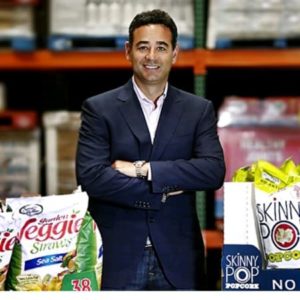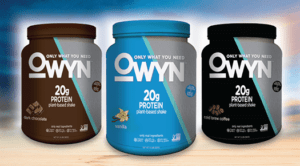(Bloomberg)—The man who helped put Skinny Pop popcorn in lunch boxes all over America is embracing Amazon.com Inc., the scourge of the grocery business.
The biggest food companies, notoriously slow to respond to consumer whims and losing market share to nimbler upstarts, desperately crave innovation to keep ahead of Amazon’s threat. And Jason Cohen, the Skinny Pop guy, has been there for them. Amazon is No. 1 in the Internet Retailer 2017 Top 500.

Jason Cohen
In the past, Cohen, a former insurance salesman who formed Halen Brands Inc. with fellow Van Halen enthusiast Leigh Feuerstein, placed brands like Skinny Pop and Veggie Straws with Costco Wholesale Corp. (No. 9). Once the products surpassed $50 million in annual sales, Cohen sold them to big companies happy to embrace winning trends.
“He’s made himself the link between the new brands and the older, larger companies,” said Carl Jorgensen, director of global thought leadership for retail consultant Daymon Worldwide. “Facilitating that is a very valuable service.”
Now Cohen is rolling out a new product, a plant-based protein drink created by a husband-and-wife team of former Ivy League athletes, on Amazon. It’s an acknowledgment that e-commerce, the latest complication in the food business, has become impossible to ignore.
“If we don’t focus on that, we’ll be a dinosaur in three or four years,” Cohen said in an interview. “It’s a very expensive proposition to make a mistake on.”
Driving growth
What Americans eat and how they eat has become increasingly vexing for Big Food.
In the past three years, as customers dine out more often and gravitate to the latest private-label products, the 10 biggest U.S. food companies have seen roughly $16 billion in revenue evaporate. Amazon, with its purchase of Whole Foods and its well-established distribution system, threatens to eat Big Food’s lunch.
The day the Whole Foods acquisition was announced, the largest food companies in the U.S., including Kraft Heinz Co., General Mills Inc., Mondelez and Campbell Soup Co., lost almost $8 billion in market value combined.
Food companies have long relied on acquisitions to drive growth and propel innovation, and they’ve started targeting smaller and smaller brand developers. General Mills Inc. and Kellogg Co. and others have in recent years tried launching venture funds aimed at sniffing out hot new products.
Other funds are also searching for the next big thing. AccelFoods, with $40 million aimed at developing the latest in natural and organic products, has backed about 30 companies since 2013. CircleUp Network Inc. has helped more than 250 food and beverage companies raise about $385 million since 2012.
Corporate laziness
“Big Food has been lazy,” said Ryan Caldbeck, CircleUp’s CEO. “There isn’t much choice but to acquire the innovation that they fail to produce internally.”
Enter Fairfield, N.J.-based Halen Brands. Its biggest success, in 2015, was steering Skinny Pop to the first-ever $1 billion initial public offering for a snack food. Cohen said his firm is in talks with at least two packaged-food companies on a novel plan: They’ll send their undeveloped ideas to Halen, let Cohen and his crew work their magic, then buy them back.
“They have ideas they don’t want to mess up, things they realize would languish inside their infrastructure,” Cohen said. “We’re experts in getting that first $50 million” in sales.
Cohen was a life-insurance salesman in 1999 looking for a side project when he had the idea to make biscotti with a message inside, like a fortune cookie. He’d failed at other business ventures—a chain restaurant, water-cooler covers that looked like fish tanks and even hyperbaric chambers.
Van Halen
One night, at a Van Halen concert in New Jersey, Cohen happened to park next to Feuerstein, a hedge-fund employee he didn’t know, and shared some cookies. A couple years later, he ran into Feuerstein at a Starbucks near his home in North Caldwell, N.J. They remembered each other from the concert and discovered that when Cohen was orchestrating the sale of the cookie brand to Keebler Foods Co., Feuerstein had a hand in evaluating the deal. Soon after, they teamed up.
Mamma Says, the cookie business, took off after getting an order from Costco. At the time, the warehouse retailer was seen as a discounter, and foodies thought Cohen was crazy for taking his product there. But Costco had tapped into a strategy that would prove popular in the grocery business: stocking products that can’t be found elsewhere. Cohen’s relationship with Costco took off after he developed Veggie Straws exclusively for the store chain. That business sold to Hain Celestial Group Inc.
Halen has a payroll of about $10 million, staffed with food industry veterans with expertise in sales, product development and marketing. The firm, with frequent funding partner Clearlake Capital, takes a controlling stake in small companies and provides management expertise, ultimately tailoring the product so it’s attractive to big food companies.
Yale quarterback
These days, Halen Brands has a handful of products, including Chef’s Cut, a jerky company founded by a New Jersey golf caddie; Road Crew Crunch, a maker of a sweet-and-savory snack mix; and Only What You Need, or OWYN, which makes the protein drinks.

OWYN, which recently debuted, was founded by Jeff Mroz and Kathryn Moos. Mroz played quarterback at Yale University and had a brief stint with the National Football League’s Dallas Cowboys. Moos was a varsity ice hockey and soccer player at Brown University who had a short professional soccer career in Iceland.
Cohen said he hopes to get the vegan product into Whole Foods next year. But for now, he’s trying to sell it on Amazon. After years of working with Costco’s buyers to tailor products for the company, Cohen is hoping to ride the rise of e-commerce.
And whether it’s online or in Costco, the goal remains the same: get to $50 million in sales and find a buyer.
“We feel we’re the best at that,” Cohen said. “We understand what the large companies need.”
